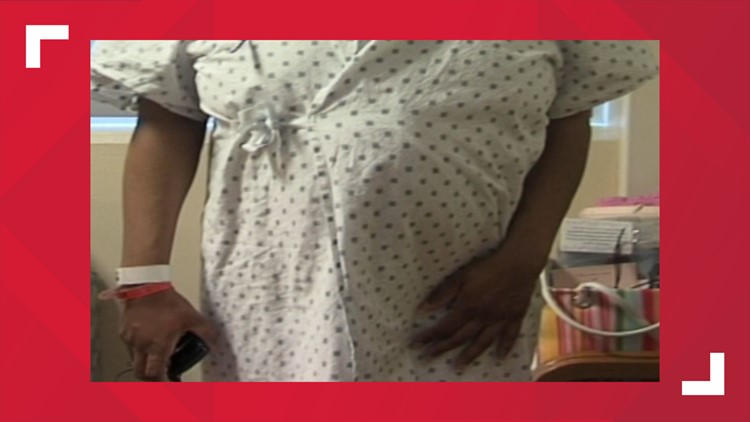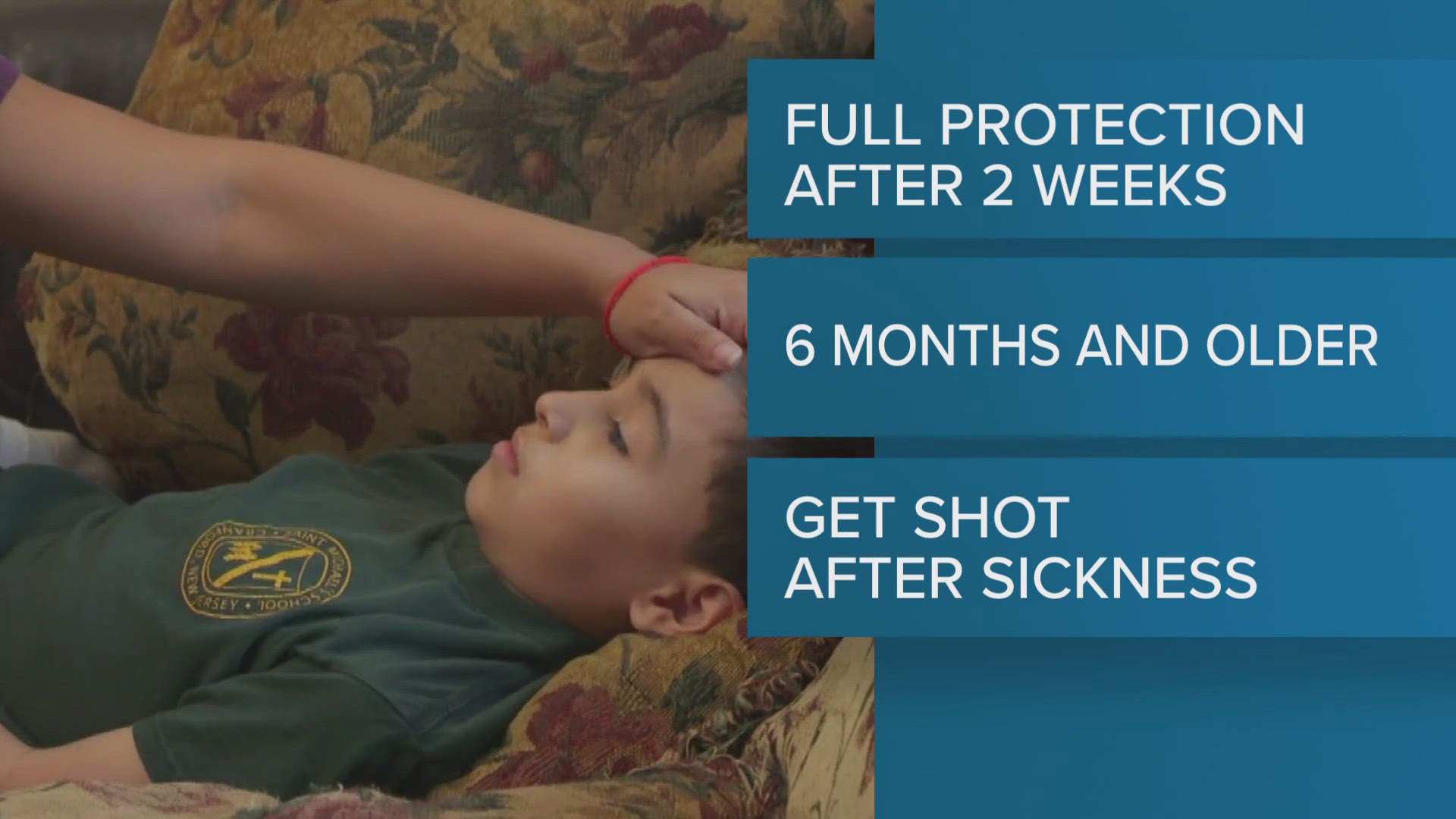ST. LOUIS — Having a baby can be one of the most exciting times in a woman’s life. But, it can also be one of the most dangerous.
“It's a period in your life people don't expect to pass away, especially women that are 25 to 35,” said Ta’Mare Banks, MSN, RN, and women’s services program manager at SSM Health St. Mary's Hospital. “It scares me that I'm at risk for passing away just because I'm an African-American woman.”
Medical studies consistently show Black, American Indian, and Alaska Native (AIAN) women of all childbearing ages have much higher rates of pregnancy related death when compared to white women.
Statistics from the Centers for Disease Control and Prevention show in 2020, the maternal mortality rate for non-Hispanic Black women was 55.3 deaths per 100,000 live births – 2.9 times the rate for non-Hispanic white women.
Banks said in many cases, there’s a lack of communication between patients and caregivers which often begins in the prenatal period. The higher risk of death during, and after, pregnancy for women of color is present regardless of the education level or health history of the mom-to-be.
“None of it matters. It's all about the medical care that you receive," Banks said.
In her work at SSM Health St. Mary’s Hospital, Banks is tailoring programs to moms at higher risk. It’s hard work she said starts with hospitals, doctors and nurses.
“There is a lot of racism in medical care towards Black women, and I feel that a lot of Black women are not heard by their physicians,” said Banks. “A lot of Black people just don't trust the health care system in general.”
For example, Banks said when a Black mom comes into the hospital, they may not be listened to, or might be rushed through an appointment.
“And then, when they have the baby, they're saying, ‘this is wrong, this is wrong, this is wrong,’ and they're being overlooked and not listened to. Then something happens and they pass. And it could have all been prevented if there was more time taken to really listen and advocate for that patient,” said Banks.
Breaking down barriers
Banks said SSM Health is working on breaking down barriers that increase the mortality risk for moms of color.
She said ultimately, more Black doctors and nurses are needed in the medical field, as well as improved communication between patients and caregivers.
“Another big area is how to pay for things,” said Banks. “So we are, as an institution, working on finding funding so that we can provide more services to these patients.”
For example, SSM St. Mary’s is identifying barriers to successful parenting before a mom delivers. This can include everything from anticipating medical complications to addressing a patient’s access to transportation, safe shelter and healthy food.
“We want to make sure that in their prenatal period, when they come in for those visits, we are identifying those barriers, that way when they get to the postpartum period, we have already instituted some measures to help,” said Banks.
Comprehensive care for expecting moms affected by substance abuse
Moms-to-be who are affected by substance abuse struggle with stigma along with their addiction.
SSM Health opened the WISH (Women and Infant Substance Help) Center which provides comprehensive, high-risk maternity care for people who are affected by opioid and other dependency.
Banks said moms may get medication assistance in the pre-natal period and a support system to help keep mom and baby together following delivery.
Educating moms
It’s also important for moms of color to know the warning signs of complications that can occur before baby arrives, and in the weeks and months after delivery.
“A lot of women are at risk of what we call preeclampsia, and this is high blood pressure that is caused by pregnancy. With preeclampsia, you can ultimately have a seizure if your blood pressure is not controlled,” said Banks.
Symptoms include headaches, blurred vision, swelling of the extremities and gastric pain under the breast.
Black Maternal Health Week events
As it works to improve Black maternal health in St. Louis, SSM Health St. Mary’s Hospital will be partnering with the St. Louis Metropolitan Alumnae Chapter Delta Sigma Theta Sorority, Inc., and the Arthur Roy Johnson Community Outreach to host The Doula Connection in honor of Black Maternal Health Week, April 11-17, 2023.
Here’s a list of events:
The Doula Connection
Community members are invited to connect with doulas and learn about community resources from 6 – 8 p.m. on Tuesday, April 11 at Delmar Divine located at 5501 Delmar Blvd in St. Louis. The event is free and open to the public. Refreshments will be provided.
What: The Doula Connection
When: Tuesday, April 11, 2023; 6 – 8 p.m.
Where: Delmar Divine – 5501 Delmar Blvd, St. Louis, MO 63112
Pop-Up Moms Group
SSM Health St. Mary’s Hospital will host a free peer-led support group for moms in honor of Black Maternal Health Week.
Community members are invited to connect with other moms on Wednesday, April 12, from 12:30-2:30 pm in the Mother Odilia Room at SSM Health St. Mary’s Hospital – St. Louis.
The event is free and open to the public.
What: Pop Up Moms Group
When: Wednesday, April 12, 2023; 12:30 – 2:30 p.m.
Where: 6420 Clayton Road, St. Louis, MO 63117
“Birthing Justice” Film Screening and Panel Discussion
When: April 14, 2023 from 6 p.m. to 8:30 p.m.
Where: St. Mary’s Hospital, Kohler Auditorium
Black women in the United States are three to four times more likely to die during childbirth than white women. "Birthing Justice," a feature-length documentary film, captures the experiences and challenges of Black women, their families, caretakers and advocates, and examines the structures and systems that determine disparate rates of mortality.
The public is invited to participate in a screening and conversation at St Mary's Hospital at 6 p.m. on April 14.
Panelists include:
Terry Plain, M.A., Senior Strategist, Missouri Foundation for Health.
Terry Plain serves as a senior strategist at Missouri Foundation for Health. With over 20 years of knowledge in philanthropic grantmaking, public health, and community collaboration, Plain leads multi-year initiatives focused on maternal and child health.
Dr. Jade James-Halbert, MD, MPH
Dr. Jade James–Halbert is a Board Certified Obstetrician/gynecologist, and the Chairperson of the SSM Health DePaul Hospital Department of Obstetrics and Gynecology. She previously held positions of: Director of Women’s Health Care STL, and President of the Missouri Board of Registration for the Healing Arts. She holds Board member positions on the Girl Scouts of Eastern Missouri and St Louis Regional Health Provider Services Advisory Board. “As much as I love taking care of patients, you do it one patient at a time. I bumped my head enough to realize we need systems change. The system is what helps more people.”
AJ Bostic
AJ Bostic is Licensed Therapist specializing in Women’s Reproductive and Perinatal Mental Health in private practice. She is a Certified Postpartum& Infant Care Doula, and offers high-quality, accessible, affordable, client-centered and culturally responsive mental health services, education, and support serving pregnant families through all pregnancy outcomes and experiences. Bostic also provides Child, Adolescent and Family Outpatient Behavioral Health care. Bostic respects the dignity, confidentiality, preferences, privacy, and rights of patients - advocating for and with patients while encouraging them to use their voice to advocate for themselves.
Dr. Ayooluwa Kerrigan
Ayooluwa Kerrigan is a Nigerian born American OB/GYN Resident at St. Louis University. She grew up in the suburbs of Chicago, and attended the University of Missouri-Columbia, where she studied premed and competed as a Track and Field athlete. Dr. Kerrigan completed her medical education at A.T. Still University. It wasn’t until her 3rd year of medical school that I figured out she wanted to dedicate her career to becoming an OBGYN. Even though she is less than a year into this work, Dr. Kerrigan quickly felt and saw what it means to be a black female physician. This is a position she says she will never take for granted, and is excited to continue to work in this community.
LaKisha Redditt
LaKisha Redditt is a woman of many hats. She's a wife, mother of 6, entrepreneur, author, teacher, and lover of all things birth. She is owner of Virtuously B'Earthed Doula Services where she not only serves doula clients, but she also started her own 12-week doula training in hopes to add more competent, ready, and willing advocates of the power of birthing individuals to the doula landscape across the nation. She is a founding member of the St. Louis Community Health Worker Coalition where she serves as Secretary on the Board of Leaders. Redditt also is Chair of the St. Louis Doula Project who won the Community Action for Reproductive Equity (CARE) Award from Pro-Choice Missouri. They implement the only black run Abortion Doula Training in the St. Louis region. A radical advocate for reproductive justice in all its forms, she championed and assisted Pro-Choice MO with the passing of Board Bill 61 , which provided funding for St. Louis City residents seeking reproductive choice. All of Redditt's hats leads her to be a resource to others. Her hope is that when she is that resource, that the resource continues to be passed to others who need it.
Prenatal and Childbirth Classes
SSM Health offers a number of prenatal, childbirth and healthy baby classes.
Banks said she’s working to create safe spaces for Black women to talk about their concerns. She’s also working to make sure caregivers involved in caring for Black moms are aware of the higher death rates for moms of color during pregnancy.
“Having a child, it's a monumental period for any woman,” said Banks.
She also wants it to be a safe one.



